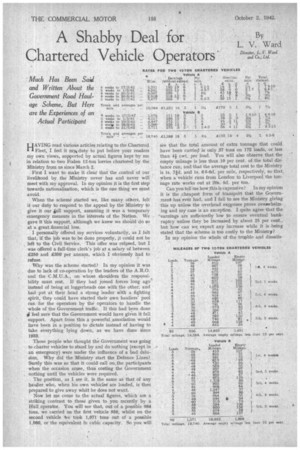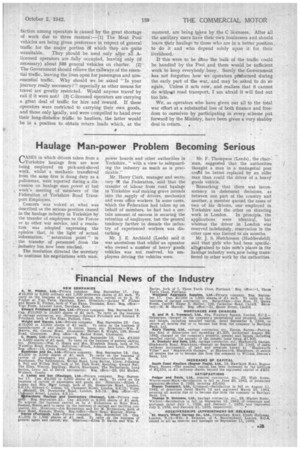A Shabby Deal for Chartered Vehicle Operators•
Page 34

Page 35

If you've noticed an error in this article please click here to report it so we can fix it.
Much Has Been Said and Written About the Government Road Haulage Scheme, But Here are the Experiences of an Actual Participant
By L. V. Ward
Director, L. V. Ward and Co., Ltd.
WAVING-read Various articles relating to the Chartered I 'Fleet, I feel it myi duty to put before your readers my own views, supported by actual figures kept by me in relation to two Baden 12-ton lorries chartered by the Ministry from us since March 2.
First I want to make it clear that the control of our livelihood by the Ministry never has and never will meet with my approval-. In my opinion it is the first step towards nationalization, which is the one thing we must avoid.
When the scheme started we, like many others, felt it our duty to respond to the appeal: by the Ministry to give it our still support, assuating it was a temporary emergency measure in the interests of -the Nation. We gave it this support, although we knew we shohld do so at a great financial loss.
I personally tittered my services voluntarily, as .1 felt that, if the job was to be done properly, it could not be left to the Civil Service. This offer was refused, but I was offered a full-time clerk's job at a salary of between 2250 and 2350 per annum, which I obviously had to refuse.
Why was the scheme started? In my opinion it was due to lack of co-operation by the leaders of the A.R.O. and the C.M.U.A., on whose shoulders the responsibility must rest. If they had joined forces long ago instead of being at loggerheads one with the other, and had put at their head a strong leader with a fighting spirit, they could have started their own hauliers' pool run for the operators by the operators to handle the whole of the Government traffic. If this had been done # feel sure that the Government would have given it full support. Apart from this a powerful association would have been in a position to dictate instead of having to take everything lying down, as we have done since 1933.
Those people who thought the Government was going to charter vehicles to stand by and do nothing (except in an emergency) were under the influence of a bad delusion. Why did the Ministry start the Defence Lines? Surely this was so that it could call onthe participants when the occasion arose, thus costing the Government nothing until the vehicles were required. .
The position, as I, see it, is the same as that of any haulier who, when his own vehicles are loaded, is then prepared to give away what he does not want.
Now let me come to the actual figures, which are a striking contrast to ,those given to you recently by a Hull operator. You will see that, out of a possible 984 tons, we carried on the first vehicle 956, whilst on the second vehicle tve took 1,071 tons out of a possible 1,080, or the equivalent hi cubic capacity. So you will
see that the total amount of extra tonnage that could have been carriecl is only $7 tons on 172 loads, or less than 4-1 cwt. per load. You will also observe that the empty mileage is less than 10 per cent, of the total distance run, and that the average total cost to the Ministry is is. 71d. and is. 65-'6d. per mile, respectively, so that when a vehicle runs from London to Liverpool the tonnage rate works out at 26s. 5d. per ton. ,
Can you tell me how this is expensive? .In my opinion it is the cheapest form of transpolt that the Government has ever had, and I fail to see the Ministry giving this up unless the overhead exppnses prove °yew/helming and my case is an exception. I quite agree that the 'earnings are sufficiently low to ensure eventual bankruptcy unless they be increased by about 25 per cent., but how can we, expect any increase while it is -being stated that the scheme is too costly to the Ministry?
In my opinion the whole of the trcnAble and dissatisMILEAGES OF TWO 12•TON CHARTERED VEHICLES Vehicle A faction among operators is caused by the great shortage of work due to three reasons The Meat Pool vehicles are being given preference in respect of general traffic for the major portion ol which they are suite
unsuitable. They hould be used only after all licensed operators are .fully occupied, leaving only (if necessary) about 500 general vehicles on charter. (2) The Government should relieve the railways of the essential traffic, leaving the lines open for passengers and nonessential traffic. Why should we be asked "Is your journey really necessary?" especially as other means for travel are greatly restricted. Would anyone travel' by rail if it were not? (3) C-licensed operators are carrying a great deal of traffic for hire and reward. If these operators were restricted to carryingtheir own goods, and those only ycally, and were compelled to hand over their long-distance taffic to hauliers, the latter would be in a position to obtain return loads which, at the
moment, are being taken by the C licensees, After all the ancillary Users have their own businesses and should leave their haulage to those who are in a better position to do it and who depend solely upon it for their livelihood.
If -this were to be cltne the bulk of the traffic could be handled by the Pool and there would be sufficient work.to keep everybody busy. Surety the Government has not forgotten how we operators phfortned during the early part of the war, and may be asked to do so again. Unless it acts now, and realizes that it cannot do withoe road transport, I am afraid it will find out too late.
We, as operators who have given our all to the total war effort at a substantial loss of both finance and freedom to ourselves by participating in every scheme put forward by the Ministry, have been given a very shabby deal in return.




























































